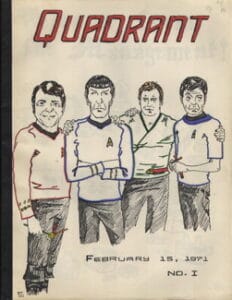This post is a continuation of a series of posts investigating Henry Jenkins’ concepts of “Convergence Culture” and “Transmedia Storytelling”.
See the full series here.
Authors of fanfiction can take extratextual themes and concepts and turn them into stories of their own and these stories are shared on websites, which operate independently from Paramount and other studios, such as Fanfiction.net and Wattpad.com.
In the introduction of Fans, Bloggers, and Gamers, Henry Jenkins noted that whilst they were writing the book “a number of fans were nervous about what would happen if their underground culture was exposed to public scrutiny. They didn’t love the media stereotypes of ‘Trekkies’, but they weren’t sure they wanted to open the closet doors either.” (2006, p. 1).

These stories vary in length, from just a few hundred words (A Lot to be Thankful For, Gin, 2001) to over ten thousand (Hell on Earth, Jasmin Kenobi, 2013).
Before the internet was readily available, “fanzines” (fan-created magazines) were produced and distributed by fans. Henry Jenkins discusses this practice in detail in Textual Poachers, noting how “many zines do not advertise in [official publications], relying on convention sales, word of mouth, or ads in other program-related zines to attract their customers.” (2013, p. 156) and that:
Jenkins also notes how some fanzines:
This is interesting, because it suggests that the producers of these fanzines were not interested in their publications becoming mainstream media. Running them as non-profit publications and relying on word of mouth and in-person sales at fan gatherings indicates the underground economy in Jenkins’ definition.
With that said, the production of these fanzines was anything but amateur, requiring a certain amount of professionalism and know-how. It is possible to interpret “drawing much of its content from the commercial culture” in two slightly different ways:
Firstly, how it is most likely to be interpreted as the fanfiction itself being influenced by the official texts – as stated earlier, fans producing their own stories, satisfying their personal desires for the characters, or perhaps changing the “official canon”, and secondly, the way in which these fanzines are constructed, presented and distributed – producers can take industry knowledge and findings and apply them to their own fanzines to make them as close to a professional publication as possible.
Although the way in which they market them is limited, they can still do so in an industry-standard way.
- Dattatreya. (2007, January 21). Desertification. FanFiction.net. https://www.fanfiction.net/s/3353763/1/Desertification
- Gin. (2001, January 8). A Lot to be Thankful For. Fanfiction.net. https://www.fanfiction.net/s/169098/1/A-Lot-to-be-Thankful-For
- Jasmin Kenobi. (2013, December 6). Hell on Earth. Fanfiction.net. https://www.fanfiction.net/s/8943388/1/Hell-on-Earth
- Jenkins, H. (2006). Fans, Bloggers, and Gamers. New York University Press.
- Jenkins, H. (2013). Textual Poachers. Routlege.
- libbiliboo. (2017, August 19). Worthless. Wattpad. https://www.wattpad.com/story/85258292-worthless-star-trek-fanfiction-completed
- nfgirl. (2006, August 5). The Big One. Fanfiction.net. https://www.fanfiction.net/s/3086312/1/The-Big-One
- [“Quadrant” Star Trek fanzine]. (n.d.). Retrieved 28 January 2025, from https://images.app.goo.gl/Akpkmg9xp9vnWvws5
APA7
Cable, J. (2025, Apr 09). Fanfiction – Henry Jenkins. JCableMedia.com. [permalink].
Chicago
Cable, John. “Fanfiction – Henry Jenkins.” JCableMedia.com. April 09, 2025. [permalink].
Harvard
Cable, J. (2025). Fanfiction – Henry Jenkins. Available at: [permalink] (Accessed: 11 February 2026).